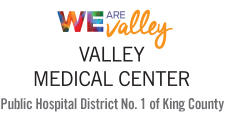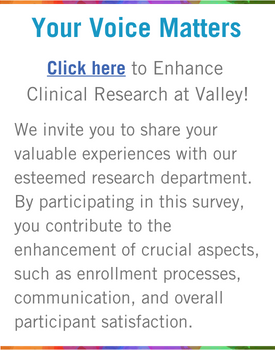Share your perspective and help improve the health of our community! We are conducting a Community Health Needs Assessment (CHNA) to help us better understand the health needs of the community our health system serves. Learn more and take the short survey.
Research at Valley Medical Center

 Valley Medical Center is pleased to support a clinical research program in order to provide access to clinical trials and research studies in our community. There are research opportunities in a variety of areas of study, including, but not limited to cancer, epilepsy, stroke, COVID-19. Please contact Research@ValleyMed.org with any questions or concerns.
Valley Medical Center is pleased to support a clinical research program in order to provide access to clinical trials and research studies in our community. There are research opportunities in a variety of areas of study, including, but not limited to cancer, epilepsy, stroke, COVID-19. Please contact Research@ValleyMed.org with any questions or concerns.
What does the Clinical Research Department do?
The Clinical Research Department at Valley is dedicated to promoting and creating opportunity for medical advancements through its diverse range of services. Our primary goal is to offer the community a chance to participate in cutting-edge clinical trials and research studies. We specialize in multiple areas of study, such as Oncology, Neurology, Pulmonary, and biospecimen research. Our clinical studies aim to grow medical knowledge and help make patient care better. These studies fall into two main categories: clinical trials, which involve interventions, and observational studies, which focus on gathering data without intervention.
How can I benefit from Clinical Research Participation?
Each research study will provide an informed consent document that outlines every potential advantages associated with the study. In general, participating in a clinical trial can offer a wide range of benefits, including:
- Receiving exceptional, high-quality care
- Gaining access to new treatments or medications
- Expanding your care team with additional experienced staff
- Undergoing thorough and attentive monitoring of your health to find and address any potential side effects
- Helping to improve medical knowledge, which can lead to the improvement of treatment options
- Possibility of financial coverage for certain aspects of treatment, as outlined in each research informed consent document.
We understand the significance of these benefits and strive to ensure that our participants are well-informed, empowered, and provided with the utmost care throughout their involvement in our clinical trials.
Our Research Department at Valley Medical Center's Clinical Research Division is dedicated to advancing cancer care, contributing to medical knowledge, and enhancing patient outcomes through careful attention to detail. Our researchers work closely with healthcare professionals from various disciplines to conduct comprehensive studies addressing the complexity of cancer.
We explore novel therapeutic interventions like targeted therapies, immunotherapies, and precision medicine approaches that have the potential to revolutionize cancer care by offering personalized and more effective treatment options. Additionally, we investigate predictive biomarkers and genetic signatures to enhance early detection, prognosis, and individualized treatment strategies.
Our research efforts extend to supportive care interventions, symptom management strategies, and survivorship programs, recognizing the multifaceted challenges faced by cancer patients and aiming to improve overall well-being and quality of life. Ultimately, our goal is to translate scientific discoveries into tangible benefits for patients, providing them with advanced and compassionate care. By pushing the boundaries of cancer research, we strive to improve outcomes, enhance survivorship, and work towards a future where cancer is effectively prevented, diagnosed, and treated. Through meticulous attention to detail and interdisciplinary collaboration, our Research Department strives to drive the frontiers of cancer care, contribute to medical knowledge, and enhance patient outcomes.
Oncology Studies
In the field of oncology, we place significant emphasis on advancing the cancer program and offering a wide array of clinical trials suitable for institutions of varying sizes. Our research team collaborates closely with attending physicians to explore potential inclusion in clinical trials.
Neurology Studies
In the field of neurology, we conduct research to improve the diagnosis, treatment, and management of specialized neurological conditions. This includes investigating new anti-seizure medications, surgical interventions, non-invasive techniques for managing seizures, and advancing stroke prevention, treatment, rehabilitation, and imaging techniques.
Pulmonology Studies
Pulmonary clinical research is a multidisciplinary endeavor aimed at enhancing our understanding of pulmonary diseases, improving diagnostic tools, developing effective treatments, and optimizing management strategies. We work closely with various departments within Valley Medical Center to ensure seamless integration and collect data throughout the study to monitor patient progress and potential side effects.
The Valley Medical Center Research Oversight Committee (ROC) protects the safety of patients participating in investigational, clinical research or observational research trials by ensuring that these activities are adequately controlled and supported in its purview. All studies that will occur at VMC or utilize VMC patients are required to be reviewed and approved by the Committee prior to any research occurring at VMC or utilizing VMC patients.
Please note that the ROC is not an institutional review board (IRB). If your study requires IRB approval, please submit it to the appropriate entity and have the IRB determination available prior to your ROC submission.
If you are unsure if your study needs ROC review or have any questions, contact the ROC Coordinator at: Research@ValleyMed.org
The Research Oversight Committee does not charge fees associated with any submission or review.
ROC review and approval is required for all research activities in which VMC is engaged. Review is required before beginning a research project at VMC (new study submission). Quality improvement projects to improve clinic processes and are not research in nature do not need ROC review. There are two separate processes, depending on where the research originates.
- Valley Medical Center: PI is a Valley Medical Center employee or has Valley Medical Center privileges.
- Outside Valley Medical Center: PI does not have privileges at Valley Medical Center. A complete submission is required for all external research, which includes a current submission form, final protocol, IRB approval or documentation of exemption, documentation that VMC is an IRB-approved site, all consents, HIPAA forms, patient-facing documents, etc.
There are separate forms for each process. Please contact the ROC coordinator for the appropriate form.
The Research Oversight Committee meets every two months. Agenda space is very limited. Four slots are reserved for internal Valley Medical Center research. Only up to two slots are expected for any external research. Please contact the ROC coordinator as soon as possible to get your study on the wait list.
A renewal or closure ROC submission is required annually. The ROC coordinator will email the applicable submission forms to the identified study team.
ClinicalTrials.gov | A service of the US National Institutes of Health
Cancer.gov | National Cancer Institute
Cancer.net | This site provides timely, comprehensive, oncologist-approved information from the American Society of Clinical Oncology (ASCO), with support from the Conquer Cancer Foundation. Cancer.net brings the expertise and resources of ASCO to people living with cancer and those who care for and about them to help patients and families make informed health care decisions.
NCORP | NCI Clinical Trials Network
You are always welcome to contact the UW Medicine | Valley Medical Center Research Department directly at Research@ValleyMed.org or 425.690.3503.


